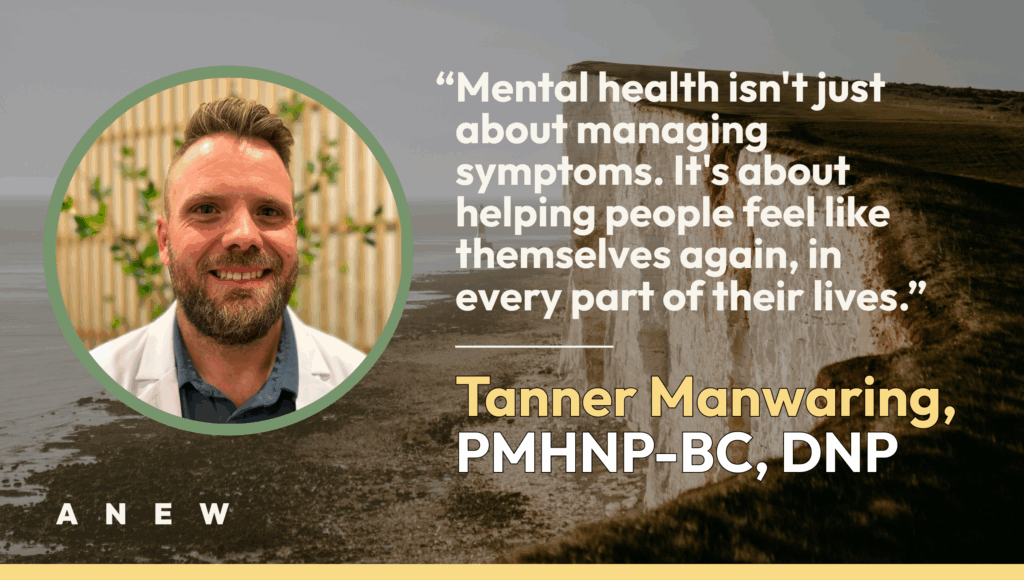Comprehensive mental health begins with a simple idea: your care should work together, not in pieces.
Too often, mental health treatment is fragmented. You might see one provider for medication, another for therapy, and a third for something else – none of them fully connected. But your mind doesn’t work in silos, and neither should your care.
What Comprehensive Mental Health Includes:
- Emotional well-being – Managing feelings and stress effectively
- Psychological well-being – Clear thinking and healthy coping skills
- Social well-being – Strong relationships and community connections
- Integrated care – Coordinated treatment across all health services
- Person-centered approach – Care custom to your unique needs and goals
For years, mental and physical health have been treated separately. But in reality, they’re deeply linked. When one suffers, the other follows. That’s why comprehensive mental health care is gaining traction; it treats you as a whole person rather than a diagnosis to manage.

If you’ve tried traditional treatments without lasting results, a more holistic approach might be the next step.
The Pillars of Comprehensive Mental Health Care
Think of your mental well-being like a house built on key pillars: emotional, psychological, and social health. Each one supports a different part of how you function and feel, and when one is weakened, the whole system feels less stable.
Emotional health is your ability to identify, express, and regulate feelings. It’s what helps you respond to stress without shutting down or spiraling. Therapy, self-awareness, and nervous system regulation all play a role in strengthening this pillar.
Psychological health involves the way you think, process information, and make meaning of your experiences. This includes managing anxiety, interrupting negative thought loops, and developing healthier cognitive patterns, especially when past trauma or chronic stress has shaped how your brain responds to the world.
Social health is often overlooked, but it matters deeply. Your relationships, support systems, and sense of connection directly influence your mental well-being. Isolation can magnify symptoms. Repairing or rebuilding trust and connection can be transformative.

When one of these pillars is neglected or unsupported, even the most proven treatments won’t feel as effective.
Why Fragmented Care Falls Short
Many individuals navigating depression, anxiety, or PTSD encounter a system that feels disjointed. One provider prescribes medication. Another offers therapy, but with limited availability or little communication with the rest of the care team. Meanwhile, newer treatments like ketamine-assisted psychotherapy (KAP) or transcranial magnetic stimulation (TMS) are often siloed from the therapeutic process entirely.
This kind of fragmentation can create gaps that delay or even derail recovery. It also places a heavy burden on the patient to coordinate care, figure out insurance, track progress, and advocate for next steps – often while in the midst of significant distress.
Comprehensive mental health care is designed to resolve those issues by aligning the clinical, emotional, and logistical components of treatment. When care is connected and continuous, the outcomes tend to be stronger and more sustainable.
How to Find a Comprehensive Mental Health Clinic
If you’re looking for care that supports long-term recovery, start by asking whether the clinic takes an integrated, whole-person approach.
Look for a team that:
- Offers multiple mental health services under one roof
- Builds personalized treatment plans based on your goals
- Includes preparation and follow-up as part of the treatment process
At Anew Therapy Utah, we’ve structured our clinic around these principles. Our providers collaborate across disciplines to create care plans that support emotional, psychological, and neurobiological healing. We offer a full spectrum of services, delivered in a setting designed to feel calming, not clinical. And because we understand the stress of getting mental health treatments covered by insurance, we work directly with your insurance provider to verify benefits, minimize surprises, and make the process as smooth and transparent as possible.
Whether or not you choose our clinic, these are the signs of a care model that’s built to support real change.
Evidence-Based Treatments That Strengthen Recovery
In recent years, several well-supported therapies have expanded what’s possible in mental health care. These new treatments work particularly well for those with treatment-resistant depression or chronic symptoms that haven’t improved with standard options.
These include:
- Ketamine therapy, which interacts with glutamate pathways in the brain to promote rapid symptom relief and increased neuroplasticity
- Ketamine-assisted psychotherapy, combining the physiological effects of ketamine with the insight and integration of a guided therapy session
- Spravato (esketamine), a prescription nasal spray that is FDA-approved for treatment-resistant depression
- TMS (Transcranial Magnetic Stimulation), a non-invasive intervention using magnetic pulses to stimulate underactive brain regions associated with mood regulation
These interventions are most effective when paired with therapy, psychiatric oversight, and appropriate preparation and aftercare.
Your Path to a Healthier Mind Starts Here

Anew Therapy in Utah was built around a single goal: to provide mental health care that actually fits real life.
We combine traditional and advanced treatments in one place, so you don’t have to navigate a scattered system on your own. Our team includes therapists, psychiatric providers, and specialists in cutting edge treatments like ketamine and TMS. We work together to design care that supports your emotional, psychological, and social well-being at the same time.
If you need talk therapy, medication support, or more advanced tools like TMS or ketamine, we can help you find the right mix. And because we believe healing happens best in a calm, supportive environment, our clinic includes spa-inspired spaces for preparing and recovering from sessions.
Comprehensive mental health care should feel connected, not complicated. If you’re looking for relief that lasts and care that meets you where you are, we’re here.Give us a call at (801) 980-2690 or schedule a free consultation online to take the next step

